Volunteer Day, dedicated to people who fought together with the Abkhaz people during the 1992-1993 PWPA, is celebrated on August 15 in Abkhazia. The WAC web info portal publishes several stories of volunteer veterans by this date.
Asta Ardzinba
The troops of the State Council of Georgia invaded Abkhazia on August 14, 1992: thus began the Patriotic War of the people of Abkhazia. The very next day, the first group of volunteers, headed by the chairman of the Committee for Self-Defense of the Confederation of Mountain Peoples of the Caucasus (KGNK) Sultan Sosnaliev, arrived in Gudauta, which remained under the control of the Abkhaz. The rest of the Republic was already occupied by Georgian troops.
The war took the Abkhaz people by surprise. The arrival of volunteers strengthened the spirit of the Abkhaz army, which was just starting to form.
Sosnaliev’s group, which arrived in Abkhazia on August 15, was only the beginning. By the way, this is the reason why the Volunteer Day in Abkhazia is celebrated on this very day.
On August 18, at an extraordinary session of the KGNK Parliament in Grozny a decision was made to provide comprehensive assistance to the fighting Abkhazia. Volunteers began to come to Abkhazia from the North Caucasus, southern Russia, from the countries of residence of the Abkhaz Diaspora abroad - Turkey, Jordan, Syria, Canada and others.
Each of these people, who at the call of their hearts came to help the Abkhaz army during the Patriotic War of 1992-1993, has his own story. However, all of them were united by one thing: nobility, courage, determination, ardent desire with the risk for their own lives to help the Abkhaz people, who did not want any war, to survive.
Khaldun
Volunteer veteran Khaldun Leiba is from Jordan. The events of the first days of the war forever engraved in his memory.
“We managed to slip through the Russian-Abkhaz border before the Georgians took control of it. Literally, some twenty minutes were crucial, because a couple of kilometers from the border we met a convoy of state councilors heading for Psou. They stopped and watched us. We had almost no weapons. I took a knife with me, hid it. Sultan [Sosnaliev] had a paper, as if we were a football team and were going to training camps. They looked at us closely and let go,” recalls Khaldun.
He was 31 years old back in 1992, and he first came to the Caucasus, the homeland of his ancestors. In Kabardino-Balkaria, in Nalchik, he met a girl whom he was going to marry.
“In Jordan, the Abkhaz speak the Kabardian language, because there are more Adygs (the collective name of the peoples of the East Caucasus, related to Abkhaz – ed.). They also marry Adyg girls. Families are mixed, and therefore the Abkhaz language has been supplanted. I only heard how the old people spoke it, but understood very little,” says Khaldun.
Due to the fact that he did not know either Abkhaz or Russian, but was fluent in Kabardian, Khaldun decided to settle in Kabardino-Balkaria, and not in Abkhazia, although he was an ethnic Abkhaz.
However, they say, you cannot escape your destiny. The events that followed shortly brought the young man to his historical homeland.
“We were in the theater with my bride. The performance was interrupted and it was announced directly from the stage that the Abkhaz were attacked. In the hall, they shouted several times: “Save Abkhazia!” That same evening I went to the Republic with the first volunteer bus headed by Sosnaliev. That girl, my bride, I have never seen her again,” recalls Khaldun.
Arriving in Abkhazia, he got into the group of a volunteer from Kabardino-Balkaria, Ibrahim Yaganov (Hero of Abkhazia - ed.). Khaldun participated in all key offensive operations of the Abkhaz army. He knew how to handle weapons well; he learned this in the Jordanian army.
“In Jordan, this is necessary, there is a war almost every two years. Abkhazia is different. Here is a resort, delicious cuisine and girls. Abkhaz do not know how and do not want to fight. They are not aggressive people. I came not to kill, but to defend my people, my homeland, which they were about to wipe from the face of the earth. This is the most important thing that I know about myself,” says Khaldun Leiba.
He is confident: his decision to fight was not an attempt to become a hero. Nor was it the sudden impulse inherent in the young. Yes, it was not even a decision, Khaldun clarifies, but predestination from above.
No one then wondered how it would be more beneficial, just “did what was required.”
“I hated it when we were given the task of shooting a sniper. To shoot at snipers is a murder. You see him and specifically aim at him. Mainly I fought with a grenade launcher - a “black weapon.” Do you know why “black”? This is the weapon of the slain. I was the tenth to whom this grenade launcher passed,” says Khaldun.
What do participants in the war most often recall after it ends? Not the victory, not how one got out of my surroundings alone, not the battles. Most often, they remember the dead comrades.
The same is about Khaldun: “He buried 35 of his friends in the war. I washed their bodies before burial according to our customs. 35 people. I remember their faces.”
Riad
Riad Arutaa, a volunteer from Syria, fought in the same quick reaction group under the command of Ibrahim Yaganov.
He came to Abkhazia with his brother Farid. They did not part in the war until Farid was killed on the Eastern Front in March 1993. He was buried in Tkuarchal.
“After my brother’s death, I went to Syria to visit my parents and support them. When the time came to return, they tried to dissuade me. They already lost one son and were afraid to lose the second. However, I did not listen to anyone, packed up and left.”
Riad has about a dozen tragicomic stories from the war. After all, it is known that in a war people continue to live and even joke. There are also stories of “nonrandom accidents” that have saved their lives.
Everyone knows about the Tamysh landing (a successful operation on the night of July 1 to 2, 1993, when the marines landed from a barge in the village of Tamysh, Ochamchira district and connected with units of the Abkhaz army of the Eastern Front - ed.). It was a success. However, it was preceded by an attempt to land in Ochamchira, which the veteran talks about so.
“We were sent off from the pier in Gudauta by the whole town. Women cried, children waved ... What kind of landing is this? One call to Sochi, and the enemy would have been warned. Finally we sailed. Then the barge stalled and began to sink. There was only water around us and the coast was not visible. Machine guns were passing by, because the water has already risen decently. We were able to get back to Gudauta. Someone then said: “I knew that we would not drown. Because Riad and Farid are true Muslims, the Most High would mercy them.” And the guys who were supposed to meet us in Ochamchira died. They all were surrounded and killed.”
Now Riad is married. He has three children and lives in Sukhum, having moved to Abkhazia about seven years ago.
In Syria, his family lived on the border with Israel in an area known as the Golan Heights. There used to be 14 Adyg villages, but now there are only three. Because of the war between Syria and Israel, the residents left, they moved mainly to Damascus. However, the war came there too.
“In 2012, I took my family out of Damascus to Sukhum, - says Riad. - The children quickly adapted. The son graduated from school that year. He had to change the curriculum, but because he has been fluent in Russian since childhood, it was not difficult for him in the Sukhum school.”
Zaur
Abaza Zaur Dzugov in 1992 was 25 years old. By this time, he had already graduated from the road technical school, had served in the Soviet army, entered and graduated from the Karachay Pedagogical Institute with a degree in physical education. The young man had peace plans ahead. He did not imagine that he would face the war.
“Nobody suggests a war ... except for those who start it. Normal people don’t think about war at all,” explains Zaur.
The Patriotic War of the people of Abkhazia was a shock, a thunder in paradise for all the villagers of Zaur. On August 14, on the first day of hostilities on Abkhaz soil, in his native Starokuvinsk, Karachay-Cherkessia, the whole village gathered in the local House of Culture. There were outrages and calls, the volunteer recalls.
Soon Zaur with a group of men began to collect humanitarian aid. People gave to the Abkhaz people everything they could: food, money, tobacco.
After the liberation of Gagra in October 1992, a war veteran, Mohammed Kilba (Hero of Abkhazia, currently Secretary of the Security Council of Abkhazia - ed.) arrived on a two-day visit to the KChR. He returned to Abkhazia already with a group of volunteers, among whom was Zaur Dzugov.
“I made the decision overnight, without even thinking. Nobody knew anything at home. Then the parents were alive, the son was a little over a year old. But I did not discuss this decision with anyone,” says Zaur, and adds: “Mohammed Kilba was, and remains, our battalion commander. A professional military man with extensive experience in the military structures of the USSR, he knew military affairs very well, was older than we were, all the guys took his command. Muhammad was the one for us in the war after the Most High. He saved many lives.”
In total, 119 volunteers from Karachay-Cherkessia participated in the war for the liberation of Abkhazia, 13 of them died. The Union of Abkhaz volunteers was created in Cherkessk in memory of them and to support the families of the victims. At a certain time, the Union was headed by Zaur Dzugov.
With his active assistance in 2016, a monument to volunteers who died for the freedom and independence of Abkhazia appeared in Cherkessk. The monument was erected in the Walk of Fame in Victory Park next to the monument to the Afghan soldiers. On a granite stone about three meters high there is a black plate with the names of the dead carved on it.
This is the second monument to Abkhaz volunteers in Russia: the first is installed in the capital of Kabardino-Balkaria, the city of Nalchik.
Glory to the courage and feat of volunteers
More than two thousand volunteers from different countries participated in the hostilities in Abkhazia. Of these, 51 people today have the title of “Hero of Abkhazia”. 247 people were awarded the Order of Leon, 623 - the medal “For Courage”. More than 260 volunteers died.
In the heroic town of Gudauta, in front of the building, where during the war the headquarters of the Confederation of Mountain Peoples of the Caucasus was located, there is a memorial stele to volunteers. The authors of the memorial are artists Batal Dzhapua, Timur Kaitan and Beslan Bagatelia. There is an eagle on the stele - a symbol of freedom, under its left wing the Abkhaz flag is depicted, and under the right - the flag of the Confederation.
This is one of the forms of immortalization of the memory of the highest manifestation of courage and human spirit of Abkhaz volunteers.
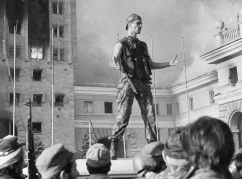
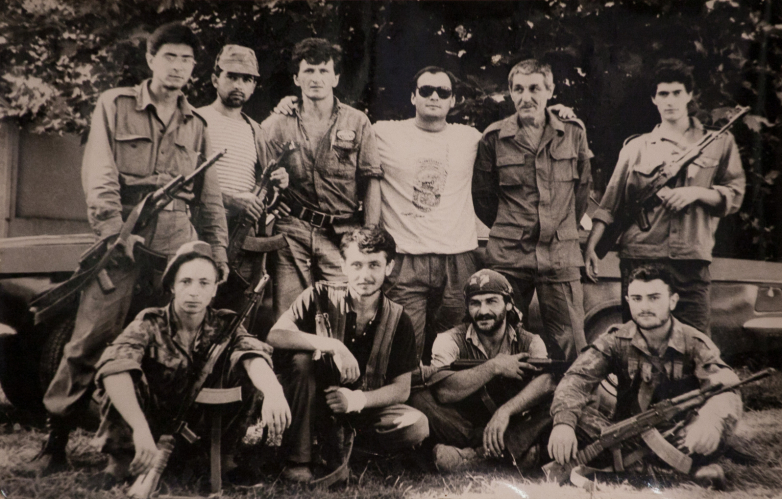
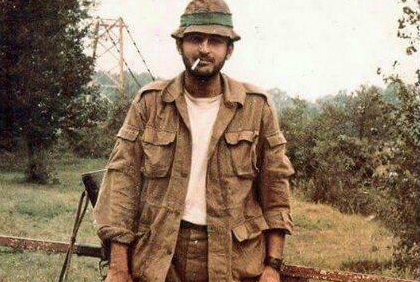
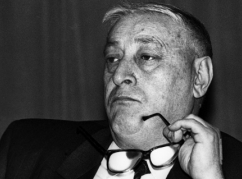
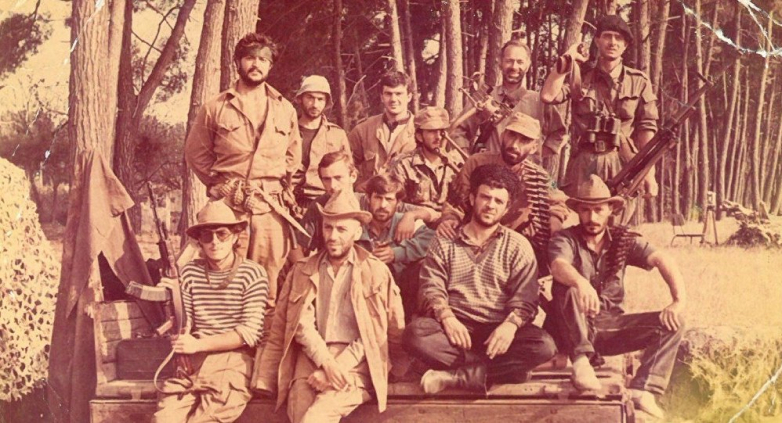
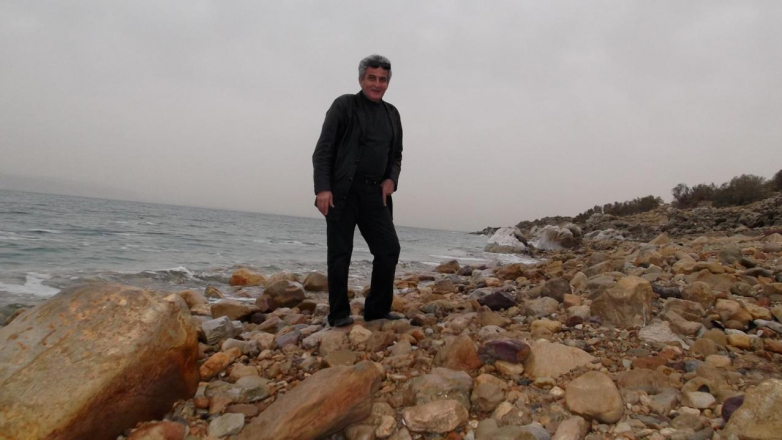
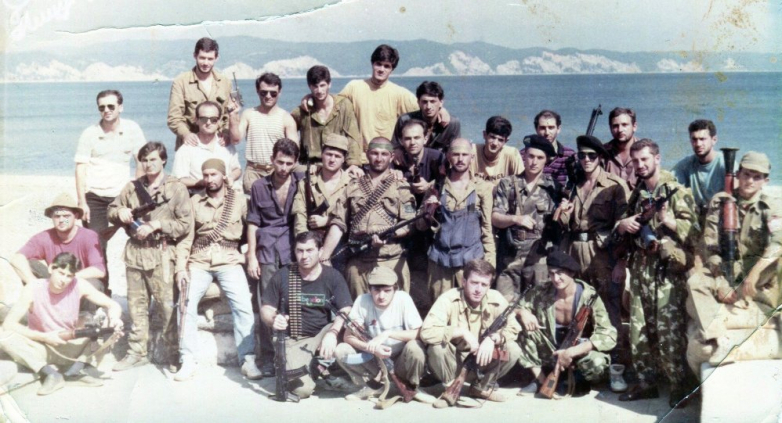
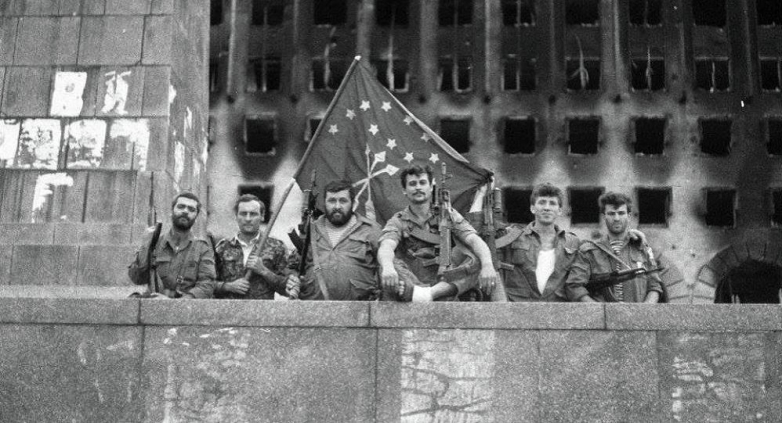
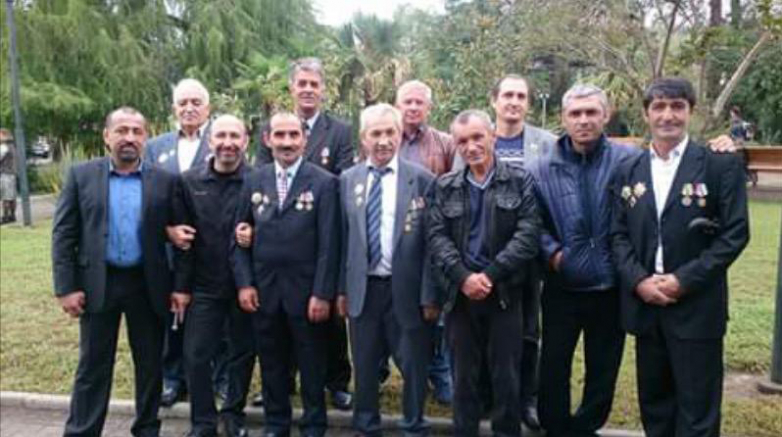
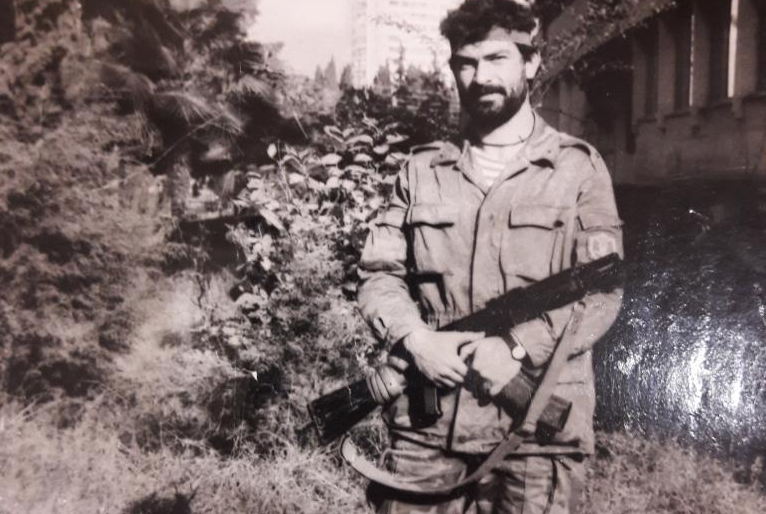
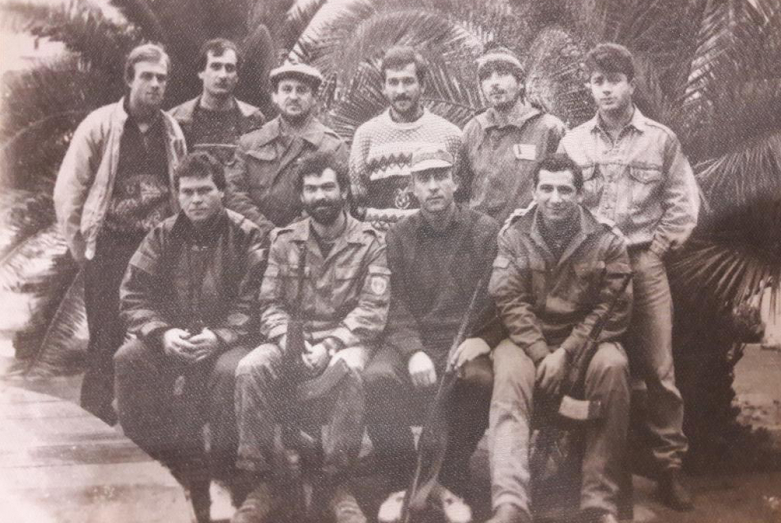
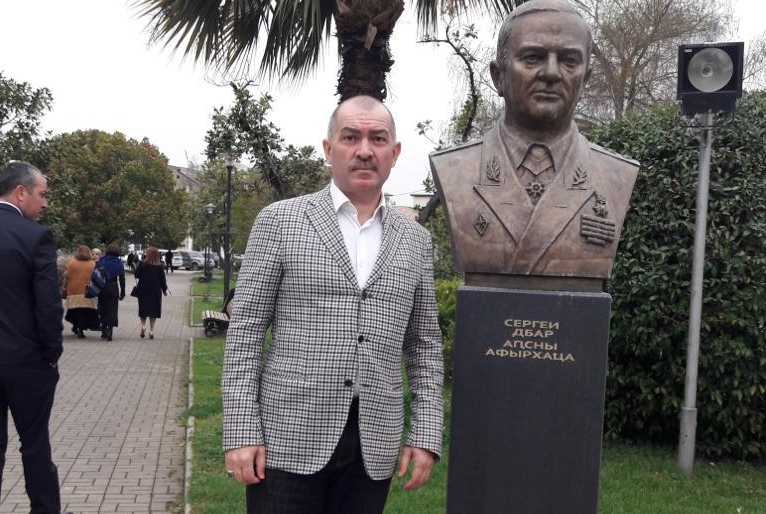
to login or register.